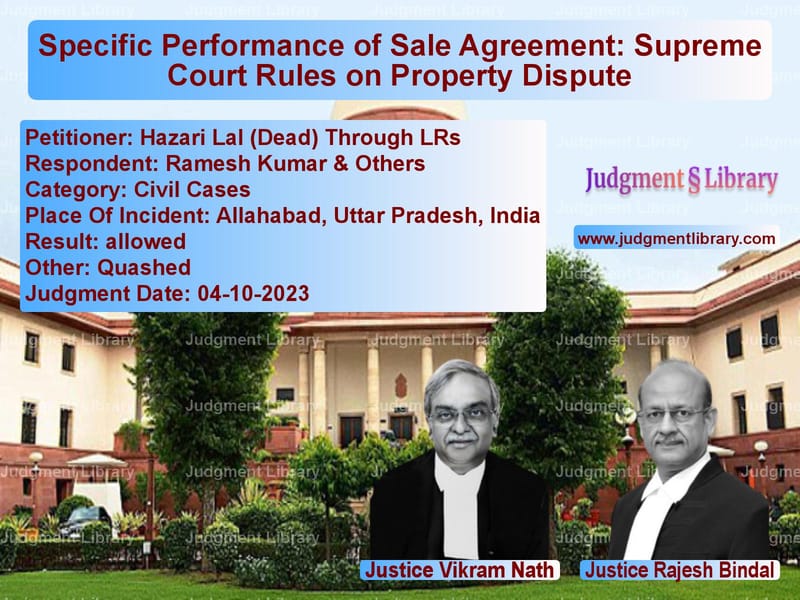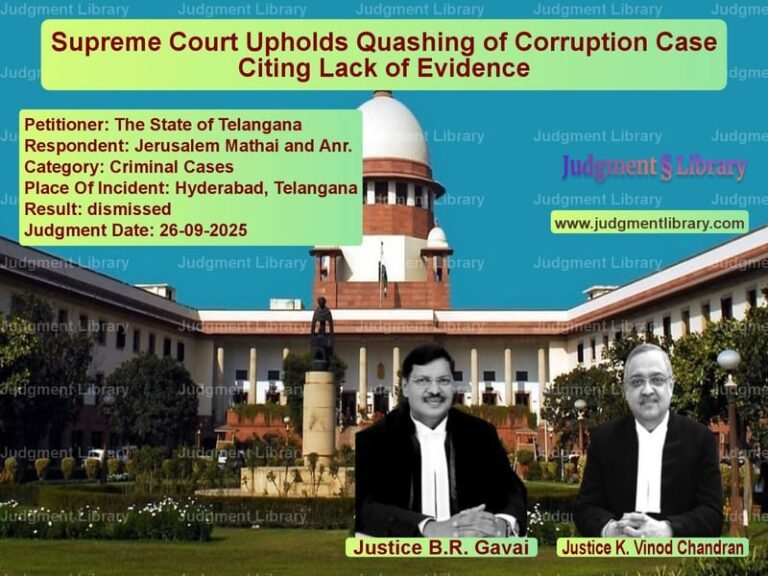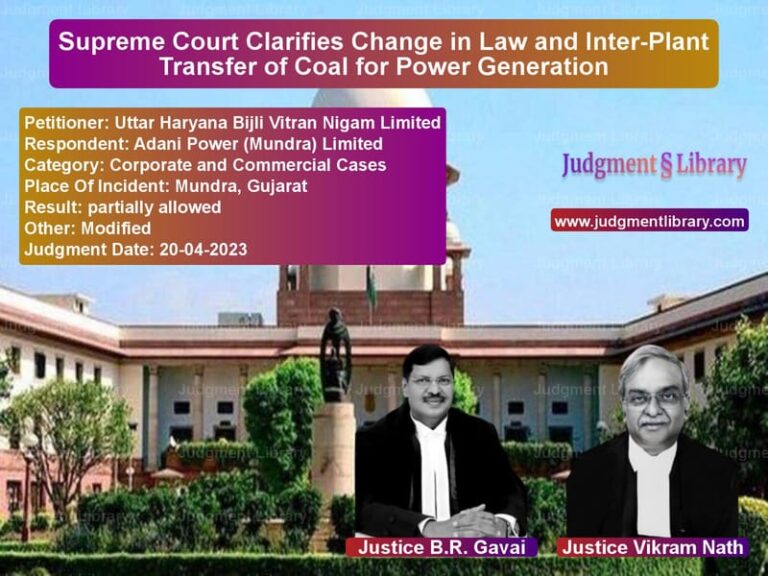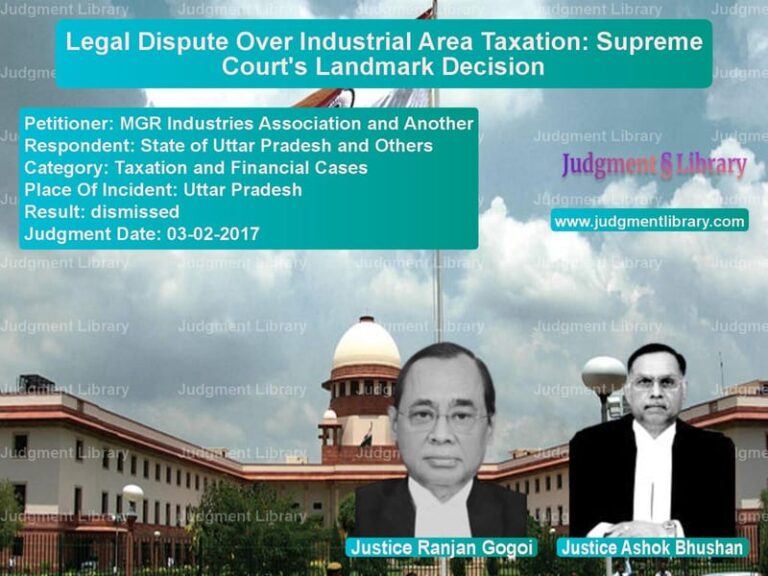Specific Performance of Sale Agreement: Supreme Court Rules on Property Dispute
The Supreme Court of India recently delivered an important judgment in Hazari Lal (Dead) Through LRs v. Ramesh Kumar & Others, deciding on the enforceability of an agreement to sell in a property dispute. The case revolved around whether a plaintiff could seek specific performance of an agreement after more than a decade when no action had been taken to enforce it earlier.
Background of the Case
The case involved a dispute over three properties located at Sadar Bazar, Allahabad. The respondents (plaintiffs in the original suit) had entered into an agreement to sell on September 24, 1986, with the owners of these properties (vendors). The total sale consideration was fixed at ₹55,000, with an earnest money deposit of ₹5,000. The agreement stated that the sale deed would be executed after obtaining permission from the Ceiling Department.
However, no sale deed was executed for more than 12 years. Meanwhile, in 1999, the appellant (defendant in the original suit) purchased two of the three properties (House Nos. 259 and 260) from the same vendors through a registered sale deed dated July 6, 1999. Soon after, the respondents (original vendees) filed a suit for specific performance of the agreement to sell and also challenged the appellant’s sale deed.
The Trial Court decreed the suit in favor of the respondents, which was upheld by the First Appellate Court and the High Court. The appellant then approached the Supreme Court.
Legal Issues Raised
- Whether the agreement to sell, executed in 1986, could be enforced after 13 years.
- Whether the requirement for permission from the Ceiling Department was a genuine condition or an excuse to delay the transaction.
- Whether the appellant, who purchased the properties through a registered sale deed, could be considered a bona fide purchaser.
- Whether the respondents had the right to seek specific performance when they had taken no steps to enforce the agreement for over a decade.
Arguments by the Appellant (Hazari Lal’s Legal Representatives)
- The agreement to sell had lapsed since no steps were taken by the respondents to enforce it within a reasonable time.
- The vendors never applied for permission from the Ceiling Department, proving that such permission was not required.
- The respondents had paid only ₹5,000 out of ₹55,000, showing a lack of readiness and willingness to complete the transaction.
- The appellant had conducted a proper title verification before purchasing the properties, making him a bona fide purchaser.
- The respondents filed the suit only after the appellant registered the sale deed in 1999, indicating a mala fide intent.
Arguments by the Respondents (Ramesh Kumar & Others)
- The vendors had agreed to sell all three properties, and the agreement was valid.
- They did not proceed with the sale earlier because they were waiting for permission from the Ceiling Department.
- The appellant had knowledge of the earlier agreement and still proceeded with the sale, making the transaction invalid.
- The respondents were always ready and willing to fulfill their part of the contract.
Supreme Court’s Observations
The Supreme Court analyzed the facts and found several flaws in the respondents’ case:
- The agreement to sell was signed in 1986, but the suit for specific performance was filed only in 1999, after the appellant registered the sale deed.
- There was no legal requirement for permission from the Ceiling Department, and the vendors had never applied for it.
- The respondents’ failure to take any steps to enforce the agreement for more than 12 years indicated a lack of genuine intent to complete the sale.
- The mere payment of ₹5,000 out of ₹55,000 was insufficient to establish readiness and willingness to complete the sale.
- The appellant had purchased the properties after conducting a title verification and could not be deprived of his ownership.
The Supreme Court referred to its previous rulings on the limitation period and the doctrine of laches, which prevents claimants from seeking relief after an unreasonable delay. It stated:
“A plaintiff seeking specific performance must demonstrate continuous readiness and willingness to fulfill contractual obligations. An unexplained delay of 12 years in enforcing the agreement raises serious doubts about the plaintiff’s claim.”
Final Judgment
The Supreme Court allowed the appeal and dismissed the suit for specific performance, ruling that:
- The respondents’ claim was barred due to unreasonable delay in enforcing the agreement.
- The requirement for permission from the Ceiling Department was an excuse used to delay the transaction.
- The appellant was a bona fide purchaser and could not be deprived of his property.
- The judgments of the lower courts were set aside as they failed to consider the legal and factual aspects correctly.
Implications of the Judgment
This ruling has significant implications for property disputes:
- Enforces timely action – Buyers must act within a reasonable period to enforce sale agreements.
- Protects bona fide purchasers – Those who buy property after due diligence cannot be deprived of ownership.
- Prevents misuse of litigation – Courts will not entertain delayed claims based on old agreements.
- Clarifies contract enforcement – The ruling emphasizes that a contract must be performed within a reasonable timeframe.
The Supreme Court’s decision reinforces the principle that real estate transactions must be completed promptly and that courts will not allow stale claims to disrupt valid property ownership.
Petitioner Name: Hazari Lal (Dead) Through LRs.Respondent Name: Ramesh Kumar & Others.Judgment By: Justice Vikram Nath, Justice Rajesh Bindal.Place Of Incident: Allahabad, Uttar Pradesh, India.Judgment Date: 04-10-2023.
Don’t miss out on the full details! Download the complete judgment in PDF format below and gain valuable insights instantly!
Download Judgment: hazari-lal-(dead)-th-vs-ramesh-kumar-&-other-supreme-court-of-india-judgment-dated-04-10-2023.pdf
Directly Download Judgment: Directly download this Judgment
See all petitions in Property Disputes
See all petitions in Specific Performance
See all petitions in Contract Disputes
See all petitions in Judgment by Vikram Nath
See all petitions in Judgment by Rajesh Bindal
See all petitions in allowed
See all petitions in Quashed
See all petitions in supreme court of India judgments October 2023
See all petitions in 2023 judgments
See all posts in Civil Cases Category
See all allowed petitions in Civil Cases Category
See all Dismissed petitions in Civil Cases Category
See all partially allowed petitions in Civil Cases Category







